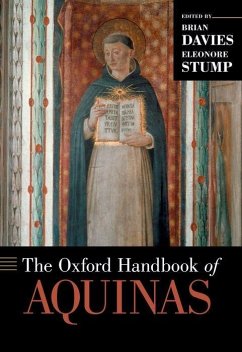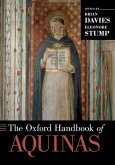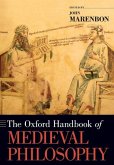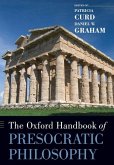Oxford Handbook of Aquinas
Herausgeber: Davies, Brian; Stump, Eleonore
Schade – dieser Artikel ist leider ausverkauft. Sobald wir wissen, ob und wann der Artikel wieder verfügbar ist, informieren wir Sie an dieser Stelle.
Oxford Handbook of Aquinas
Herausgeber: Davies, Brian; Stump, Eleonore
- Gebundenes Buch
- Merkliste
- Auf die Merkliste
- Bewerten Bewerten
- Teilen
- Produkt teilen
- Produkterinnerung
- Produkterinnerung
Thomas Aquinas (1224/6-1274) produced many works, varying in length from a few pages to a few volumes. The present book is an introduction to this influential author and a guide to his thought on almost all the major topics on which he wrote.
Andere Kunden interessierten sich auch für
![The Oxford Handbook of Aquinas The Oxford Handbook of Aquinas]() The Oxford Handbook of Aquinas66,99 €
The Oxford Handbook of Aquinas66,99 €![The Oxford Handbook of Medieval Philosophy The Oxford Handbook of Medieval Philosophy]() The Oxford Handbook of Medieval Philosophy59,99 €
The Oxford Handbook of Medieval Philosophy59,99 €![Christian Philosophy of St. Thomas Aquinas Christian Philosophy of St. Thomas Aquinas]() Etienne GilsonChristian Philosophy of St. Thomas Aquinas36,99 €
Etienne GilsonChristian Philosophy of St. Thomas Aquinas36,99 €![Aquinas on Beauty Aquinas on Beauty]() Christopher Scott SevierAquinas on Beauty139,99 €
Christopher Scott SevierAquinas on Beauty139,99 €![Aquinas on Efficient Causation and Causal Powers Aquinas on Efficient Causation and Causal Powers]() Gloria Frost (Minnesota University of St Thomas)Aquinas on Efficient Causation and Causal Powers92,99 €
Gloria Frost (Minnesota University of St Thomas)Aquinas on Efficient Causation and Causal Powers92,99 €![The Oxford Handbook of Presocratic Philosophy The Oxford Handbook of Presocratic Philosophy]() The Oxford Handbook of Presocratic Philosophy64,99 €
The Oxford Handbook of Presocratic Philosophy64,99 €![Why Aquinas Matters Now Why Aquinas Matters Now]() Oliver KeenanWhy Aquinas Matters Now18,99 €
Oliver KeenanWhy Aquinas Matters Now18,99 €-
-
-
Thomas Aquinas (1224/6-1274) produced many works, varying in length from a few pages to a few volumes. The present book is an introduction to this influential author and a guide to his thought on almost all the major topics on which he wrote.
Produktdetails
- Produktdetails
- Oxford Handbooks
- Verlag: Oxford University Press Inc
- Seitenzahl: 608
- Erscheinungstermin: 25. Januar 2012
- Englisch
- Abmessung: 260mm x 192mm x 48mm
- Gewicht: 1156g
- ISBN-13: 9780195326093
- ISBN-10: 0195326091
- Artikelnr.: 33602958
- Herstellerkennzeichnung
- Libri GmbH
- Europaallee 1
- 36244 Bad Hersfeld
- gpsr@libri.de
- Oxford Handbooks
- Verlag: Oxford University Press Inc
- Seitenzahl: 608
- Erscheinungstermin: 25. Januar 2012
- Englisch
- Abmessung: 260mm x 192mm x 48mm
- Gewicht: 1156g
- ISBN-13: 9780195326093
- ISBN-10: 0195326091
- Artikelnr.: 33602958
- Herstellerkennzeichnung
- Libri GmbH
- Europaallee 1
- 36244 Bad Hersfeld
- gpsr@libri.de
Brian Davies is Professor of Philosophy at Fordham University, New York, where he has taught since 1995. He previously taught at Oxford University, U.K. In 2005 he received the American Catholic Philosophical Association's Aquinas Medal for Eminence in Philosophy. His research interests are in medieval philosophy and philosophy of religion. He is currently the Editor of Oxford University Press's 'Great Christian Thinkers' series. Eleonore Stump is the Robert J. Henle, SJ, Professor of Philosophy at Saint Louis University, where she has taught since 1992. She is past president of the Society of Christian Philosophers, the American Catholic Philosophical Association, and the American Philosophical Association, Central Division. She presented the Gifford Lectures in Aberdeen, Scotland (2003), the Wilde lectures at Oxford (2006), and the Stewart lectures at Princeton (2009). In 2004, she received the Robert Foster Cherry Award for Great Teaching from Baylor University.
Introduction
1: Life and Works
2: Historical Background
(a) Aquinas and Aristotle
(b) Augustine to Aquinas (Latin-Christian authors)
(c) Aquinas, Plato, and Neo-Platonism
(d) Aquinas and Jewish and Islamic authors
3: Metaphysics and the Existence of God
(a) Being
(b) Matter, Form, and Individuation
(c) Causation
(d) The Five Ways
(e) The Limits of Language and the Notion of Analogy
4: The Divine Nature
(a) God's Simplicity
(b) God's Goodness
(c) God's Knowledge and Will
(d) God's Impassibility, Immutability, and Eternality
(e) God's Omnipotence
5: Ethics and Action Theory
(a) Human Freedom and Agency
(b) Emotions
(c) Happiness
(d) Law and Natural Law
(e) Conscience and Synderesis
(f) Virtues and Vices
(g) Practical Reasoning
6: Epistemology
(a) Human Knowledge
(b) Intellectual Virtues
(c) The Relation of Reason to Faith
7: Philosophy of Mind and Human Nature
8: Theory of Language
9: The Theological Virtues
10: Providence and the Problem of Evil
11: Philosophical Theology
(a) Trinity
(b) Incarnation
(c) The Saving Work of Christ
(d) Sacraments
(e) Resurrection and the Separated Soul
(f) Prayer
(g) The Gifts and Fruits of the Holy Spirit
12: The Development of Aquinas's Thought
13: The Influence of Aquinas
Chronological List of Aquinas's Writings
Editions and Translations
1: Life and Works
2: Historical Background
(a) Aquinas and Aristotle
(b) Augustine to Aquinas (Latin-Christian authors)
(c) Aquinas, Plato, and Neo-Platonism
(d) Aquinas and Jewish and Islamic authors
3: Metaphysics and the Existence of God
(a) Being
(b) Matter, Form, and Individuation
(c) Causation
(d) The Five Ways
(e) The Limits of Language and the Notion of Analogy
4: The Divine Nature
(a) God's Simplicity
(b) God's Goodness
(c) God's Knowledge and Will
(d) God's Impassibility, Immutability, and Eternality
(e) God's Omnipotence
5: Ethics and Action Theory
(a) Human Freedom and Agency
(b) Emotions
(c) Happiness
(d) Law and Natural Law
(e) Conscience and Synderesis
(f) Virtues and Vices
(g) Practical Reasoning
6: Epistemology
(a) Human Knowledge
(b) Intellectual Virtues
(c) The Relation of Reason to Faith
7: Philosophy of Mind and Human Nature
8: Theory of Language
9: The Theological Virtues
10: Providence and the Problem of Evil
11: Philosophical Theology
(a) Trinity
(b) Incarnation
(c) The Saving Work of Christ
(d) Sacraments
(e) Resurrection and the Separated Soul
(f) Prayer
(g) The Gifts and Fruits of the Holy Spirit
12: The Development of Aquinas's Thought
13: The Influence of Aquinas
Chronological List of Aquinas's Writings
Editions and Translations
Introduction
1: Life and Works
2: Historical Background
(a) Aquinas and Aristotle
(b) Augustine to Aquinas (Latin-Christian authors)
(c) Aquinas, Plato, and Neo-Platonism
(d) Aquinas and Jewish and Islamic authors
3: Metaphysics and the Existence of God
(a) Being
(b) Matter, Form, and Individuation
(c) Causation
(d) The Five Ways
(e) The Limits of Language and the Notion of Analogy
4: The Divine Nature
(a) God's Simplicity
(b) God's Goodness
(c) God's Knowledge and Will
(d) God's Impassibility, Immutability, and Eternality
(e) God's Omnipotence
5: Ethics and Action Theory
(a) Human Freedom and Agency
(b) Emotions
(c) Happiness
(d) Law and Natural Law
(e) Conscience and Synderesis
(f) Virtues and Vices
(g) Practical Reasoning
6: Epistemology
(a) Human Knowledge
(b) Intellectual Virtues
(c) The Relation of Reason to Faith
7: Philosophy of Mind and Human Nature
8: Theory of Language
9: The Theological Virtues
10: Providence and the Problem of Evil
11: Philosophical Theology
(a) Trinity
(b) Incarnation
(c) The Saving Work of Christ
(d) Sacraments
(e) Resurrection and the Separated Soul
(f) Prayer
(g) The Gifts and Fruits of the Holy Spirit
12: The Development of Aquinas's Thought
13: The Influence of Aquinas
Chronological List of Aquinas's Writings
Editions and Translations
1: Life and Works
2: Historical Background
(a) Aquinas and Aristotle
(b) Augustine to Aquinas (Latin-Christian authors)
(c) Aquinas, Plato, and Neo-Platonism
(d) Aquinas and Jewish and Islamic authors
3: Metaphysics and the Existence of God
(a) Being
(b) Matter, Form, and Individuation
(c) Causation
(d) The Five Ways
(e) The Limits of Language and the Notion of Analogy
4: The Divine Nature
(a) God's Simplicity
(b) God's Goodness
(c) God's Knowledge and Will
(d) God's Impassibility, Immutability, and Eternality
(e) God's Omnipotence
5: Ethics and Action Theory
(a) Human Freedom and Agency
(b) Emotions
(c) Happiness
(d) Law and Natural Law
(e) Conscience and Synderesis
(f) Virtues and Vices
(g) Practical Reasoning
6: Epistemology
(a) Human Knowledge
(b) Intellectual Virtues
(c) The Relation of Reason to Faith
7: Philosophy of Mind and Human Nature
8: Theory of Language
9: The Theological Virtues
10: Providence and the Problem of Evil
11: Philosophical Theology
(a) Trinity
(b) Incarnation
(c) The Saving Work of Christ
(d) Sacraments
(e) Resurrection and the Separated Soul
(f) Prayer
(g) The Gifts and Fruits of the Holy Spirit
12: The Development of Aquinas's Thought
13: The Influence of Aquinas
Chronological List of Aquinas's Writings
Editions and Translations








